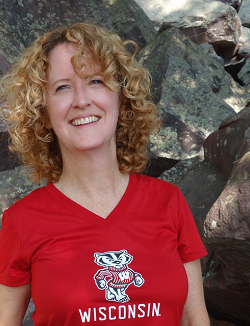- Home
- About UCGIS
- News and Stories
- Community
- Programs & Projects
- TRELIS
- Symposia
- Summer Schools
- Webinars & Workshops
- Instructional Resources
- GIS&T Body of Knowledge
- I-GUIDE
- Completed Projects
- Join
Symposium 2021: Keynote AddressDr. Lea ShanleyMoving from Science to Impact in the world of Geographic Information Science and PolicyGeospatial Information Science (GIScience) and geospatial technologies provide powerful tools for assessing, understanding, and addressing critical national and global challenges, such as the climate change, public health, transportation, and social and environmental justice, among many others. As geospatial scientists, we have an incredible opportunity and perhaps a civic duty to use these technologies to help inform public policy. Publishing journal articles and hoping that policy makers will read them, however, is unlikely to move the needle. We must communicate our research findings for a policy audience in a way that is easy for them to act upon. Conversely, science and technology policy can help to support the field of GIScience, from NSF budget priorities to the Geospatial Act of 2018. This presentation will explore the challenges, opportunities, and strategies for working with policymakers and governmental organizations – moving from science to impact!
Dr. Lea Shanley is the director and president of the International Computer Science Institute (ICSI) in Berkeley, California. Shanley previously served as a senior fellow at the Nelson Institute of the University of Wisconsin-Madison, a White House Presidential Innovation Fellow under the Obama Administration while working at NASA and GSA 18F; a founding co-executive director of the NSF South Big Data Innovation Hub; the founding director of The Wilson Center’s Commons Lab in Washington, D.C.; an AAAS Congressional Science Fellow and primary science advisor to former Senator Bill Nelson (FL); and a postdoc with the NASEM Mapping Science Committee. She also served as the co-founder of the Federal Community of Practice on Crowdsourcing and Citizen Science (FedCCS), which resulted in Citizenscience.gov, a White House Memorandum, a federal statute, and team recognition as a finalist for the 2017 Ash Award by Harvard’s Kennedy School of Government. Her research has focused on bringing spatial technologies, computer-supported cooperative work, and social computing to bear on scientific and societal challenges, as well as addressing issues in science and technology policy and research data policy. Dr. Shanley serves on the advisory committee for the NASA Socioeconomic Data and Applications Center, on the Scientific Council for the NASA Consortium for the Valuation of Applications Benefits Linked to Earth Science, and on the Board of Trustees for US/ICOMOS (International Committee of Monuments and Sites). She also is a member of the IEEE Indigenous Data Sovereignty Working Group, and the intergovernmental Group on Earth Observations (GEO) Data Working Group, for which she co-chairs their Data ethics/law/policy (ELP) subgroup. Dr. Shanley holds a Ph.D. focused on Geographic Information Science and Earth observation from the University of Wisconsin-Madison. Visit Lea Shanley’s Website and at Twitter: Lea_Shanley
|

